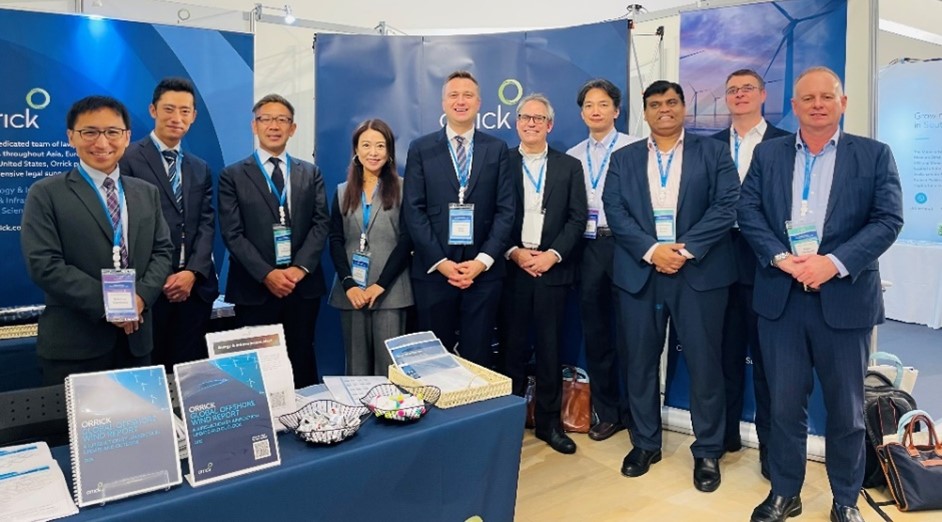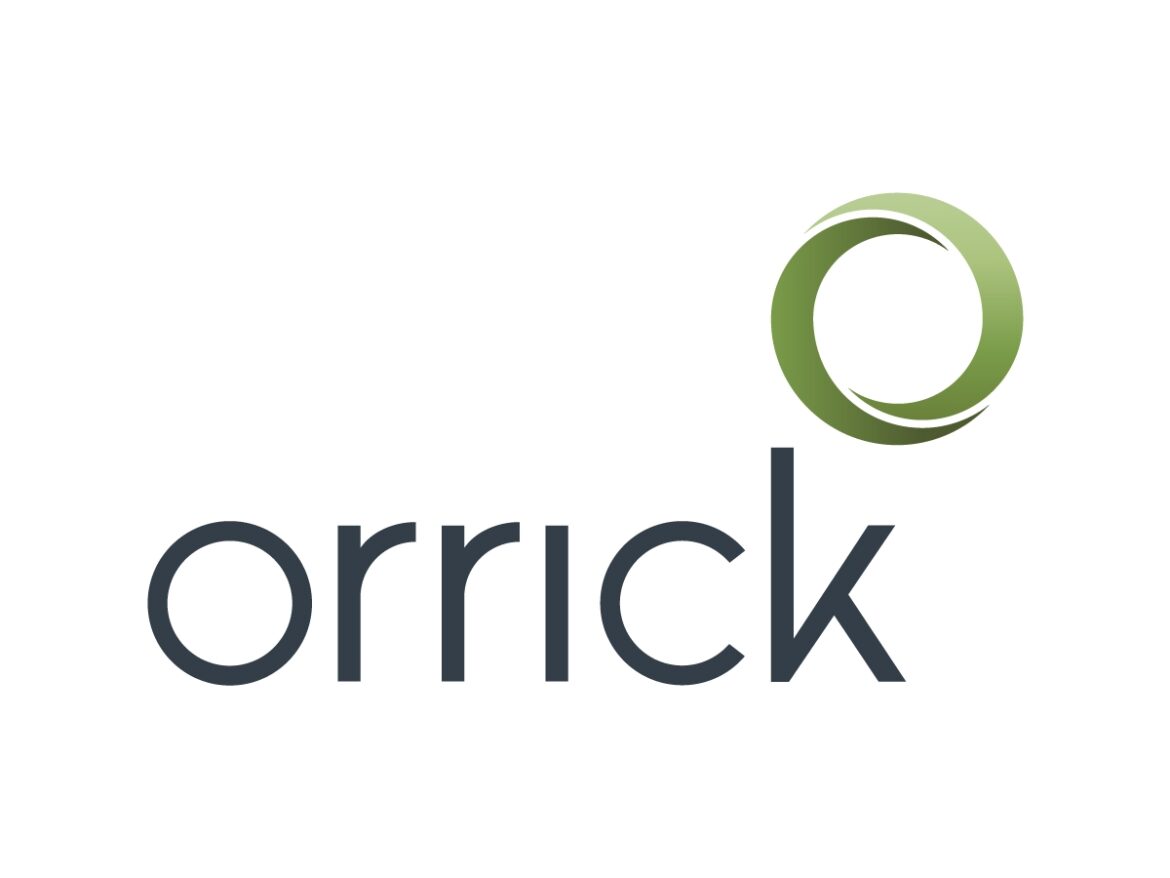日本語: エネルギー関連マーケットの現状
As our Japan Renewables Alerts usually provide updates on important regulatory amendments in the renewable field, this issue provides an overview of the market landscape by introducing some of our recent activities.
1. Offshore Wind in Japan
From October 15 – 17, 2025, the Global Offshore Wind Summit Japan (GOWS-J) was held in Akita City, Akita Prefecture (here). We participated in GOW-J as a sponsor and hosted a booth at the venue, where lawyers from our Tokyo, London, and Singapore offices engaged in discussions with visitors. We would like to express our gratitude to the many people who visited our booth.
In the main hall sessions, Adam Smith, partner in Orrick’s London office participated as a panelist and discussed corporate PPAs in offshore wind projects and shared insights from the European market. Lawyers from our Tokyo office, including Minako Wakabayashi (Tokyo Bar Association), and our Singapore office also introduced the APAC market and our firm’s activities in the region.
In August 2025, the announcement of withdrawal by the selected operator for the three sea areas of Round 1 brought a significant shock to Japan’s offshore wind industry. METI (Ministry of Economy, Trade and Industry) is now discussing reforms to the offshore wind auction system, taking into account critiques being raised by renewable developers and other industry participants, as well as experts with knowledge of offshore wind regarding the auction regime’s design.
On October 3, 2025, the government newly designated offshore Akita City (Akita) and other areas as “prospective areas,” and offshore Asahi City (Chiba) and other areas as “preparatory areas,” signaling further moves toward further designation of promotion areas in the future. As it remains an urgent task for the Japanese government to appropriately advance offshore wind from both environmental and industrial policy perspectives, the industry is closely watching the future development of the offshore wind auction scheme.

At GOWS-J: From left to right, Gohshun Kawamura, Naoyuki Fukuda, Akira Takahashi, Minako Wakabayashi, Adam Smith, Andrew Hughes, Kentaro Shoji, Karthik Kumar, Michael Tardif and Adam Moncrieff.
2. Investment in U.S. Energy Market
On October 3, 2025, together with the Japan Institute for Overseas Investment (JOI) and Marathon Capital, we hosted a seminar titled “The U.S. Energy Power Shift: Energy Policy, Gas Markets, Renewable Energy, and the Surging Demand for Data Centers” (here).
Minako Wakabayashi (Tokyo Bar Association) and Andrew Hughes (New York-qualified) from our Tokyo office joined other market-leading panelists to discuss recent regulatory and market developments affecting power market investments with a primary focus on the U.S. market, including the impact of the One Big Beautiful Bill Act (OBBBA) enacted in July 2025, as well as the current trends in project financing, and predictions for future developments.
3. Comprehensive Support in Renewable Development Including Construction Agreements and PPAs
Kentaro Shoji (Dai-ichi Tokyo Bar Association) from our Tokyo office was invited to lecture on renewable energy law as a visiting associate professor at the Graduate School of Law, Musashino University, from April to July in 2025. The course covered all phases of renewable development, including land acquisition, permitting, construction, PPAs, and financing, drawing on our expertise in legal theory and practical knowledge gained through our extensive experience.
Kentaro has been involved in every phase of renewable development and is one of the few lawyers in the Japanese market with extensive experience in construction-related contracts. We can fully support the review, preparation or negotiation of various project documents, including corporate PPAs and construction contracts, as well as providing advice on financing and due diligence on permitting, leveraging our practical expertise.
4. BESS Tolling Arrangments and Co-Located BESS Installment
On September 24, 2025, at an event hosted by Akaysha Energy on utility-scale batteries and innovative tolling arrangements, Gohshun Kawamura (Tokyo Bar Association) of our Tokyo office spoke as a panelist (here).
With respect to standalone BESS, relevant amendments to the Electricity Business Act came into force in April 2023 following the development in the industry. Driven by growing social demand due to the increase of VREs, BESS development is booming. As of the end of June 2025, 143 GW are in the interconnection study phase and 18 GW are at the interconnection application phase (see here for METI’s material in Japanese). Market players are now turning their eyes to long-term tolling agreements for batteries with the intention to achieve project finance for large BESS projects. BESS tolling agreements are contracts under which the BESS developer/owner entrusts its operation (charging/discharging and participation in various markets) to the offtaker. Orrick has established and leads market practice in the United States and has handled several cases in Japan as well.
In addition to such standalone BESS projects, we have seen an increasing interest in models of co-located BESS installed at renewable power plants and have been receiving multiple inquiries in Japan—similar to other markets such as the U.S. METI, primarily with solar in mind, has enacted various regulatory amendments and operational adjustments to support operators in converting FIT projects to FIP and adding co-located batteries (FIP conversion + BESS co-location), with the interim goal of increasing the ratio of FIP projects out of all FIT/FIP projects to 25% for years to come. For instance, since FIP conversion + BESS co-location requires both the FIP conversion procedure and a FIP amendment approval procedure for installation of the battery, in August 2025, METI streamlined its operation of the procedures required by the FIT/FIP Act and announced these updates to the public (here).
However, when acquiring FIT projects from a third party—rather than converting already-owned FIT projects to FIP—it is necessary to obtain a change certification after the acquisition (either through business transfer or transfer of SPC shares). In principle, when applying for this change certification, it is generally required to hold a community briefing session in accordance with the Renewable Energy Special Measures Act.
However, note that, when acquiring FIT projects from third parties rather than FIP-converting your existing projects, amendment approval will be required for such acquisition (business transfer or SPC membership transfer) after the acquisition. In such cases, (i) in principle, you are required to hold an information session for local residents pursuant to the FIT/FIP Act for such amendment approval application, and (ii) METI may reexamine whether the land titles for the project site are sufficiently secured, especially in cases where the project owner changes as a result of business transfer. Developers should be aware that: (i) multiple projects have received instructions from METI to redo the information session due to formal and minor discrepancies with standards that are not necessarily indicated in the regulations and guidelines (see our Japan Renewables Alert 70), and (ii) with respect to the facility location requirement, as METI has repeatedly made de facto changes to the examination standards without any prior notice, formal regulatory amendments or public comment process, METI may point out non-compliance with the current standards or unpublished new standards and require corrections, even though the project had duly obtained an original FIT approval in accordance with the applicable standards at the time.
5. Data Centers
The recent expansion of gen-AI has fueled a growing interest in the construction of and power supply to data centers, and Orrick has been a leader in the field of data center development in United States. A panel discussion on data centers was held in May 2025 (here) and a guidebook on data centers primarily based on our experience in the U.S. market was published in July 2025 (here).
We distributed this guidebook, along with a tentative Japanese translation, free of charge, to those who attended the seminar on the U.S. Power Shift and to those who visited our booth at GOWS-J.
[View source.]


AloJapan.com